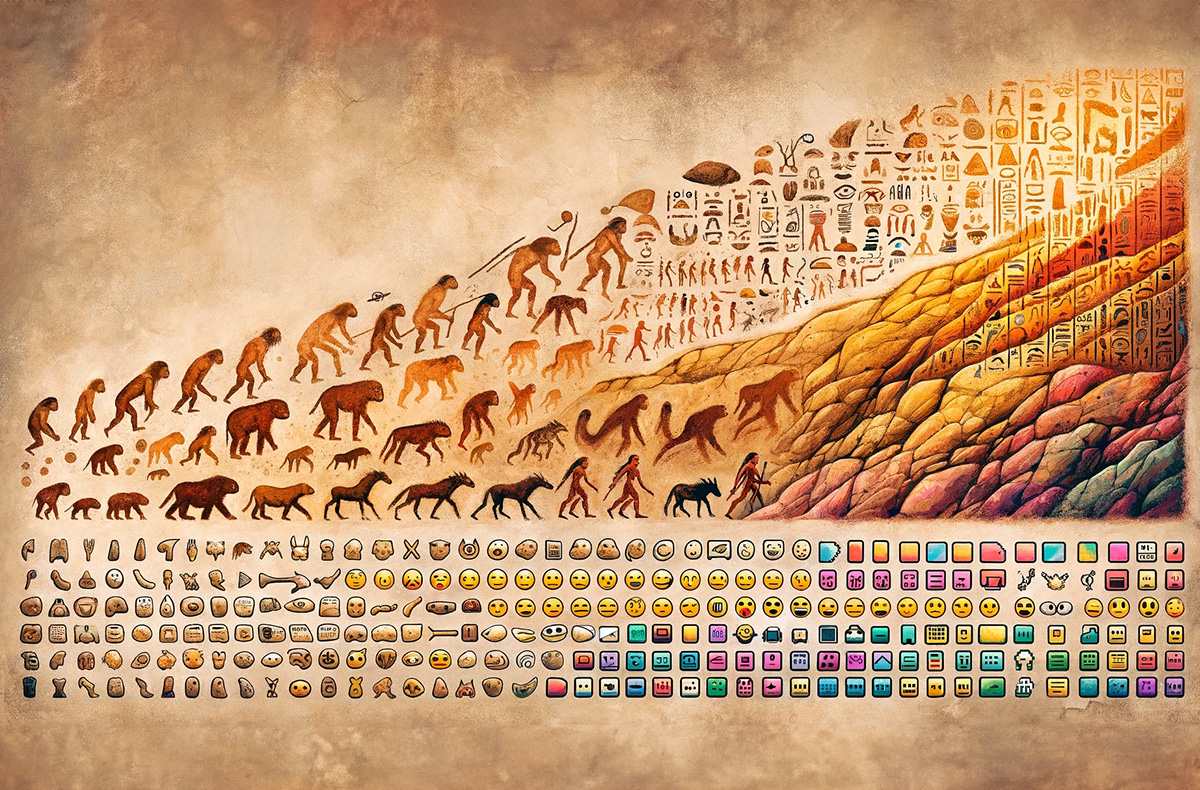Just as some old-fashioned librarians and teachers decry the fact that the new generations no longer read (although people are reading MUCH more than previous generations, just usually online), some people also lament the increasing use of emojis, viewing it as a sort of regression back to the days of cave paintings. Is the internet not only shortening our attention spans, but deteriorating our linguistic skills as well? Or is this a natural progression of language in the digital age that in fact brings about advanced levels of nuance and succinctness? Here we’ll look at a brief history of how we got to such prevalent emoji-ing.
:-) to 🙂
Before the days of Generation Alpha, Zoomers, and more widespread emoji use, a more rudimentary pictorial system emerged in the early days of the internet. Emoticons, their name a portmanteau of emotion + icon, are those horizontal ancestors of emojis that first appeared over 40 years ago. As instant messaging, text messaging, and the prevalence of mobile phones all increased from the year 2000 on, so too did the use of emoticons. They were simplistic, but used for the same purpose as emojis – to convey sentiment concisely. Emoticons are largely extinct now, as many phones and computers now automatically convert a :-/ to a 😕.
Emojis Arrive
Emojis, the small digital images that express emotion, were invented in the late ‘90s by a Japanese company called NTT DoCoMo, and the word emoji itself can be roughly translated from Japanese as “pictograph.” Unlike emoticons which simply repurposed existing letters and punctuation, emojis required an actual technological advancement, and many tech behemoths tried to steal credit. Twitter, Apple, and Google all had their own interpretations of what different emojis should look like, with some preferring simple cartoon depictions and others employing the ill-fated “blob emojis.”
These were largely used in informal communications and did not catch on all that quickly, being seen as more of a novelty or way to joke around during an aimless conversation. In fact, it was not all that long ago that the thought of including a 🙏 or 👍 in an email reply would have been preposterous to most, and critics viewed emojis as a passing fad for younger generations.
The Emoji Boom
Whether thanks to the increased popularity of social media, character limits on Twitter and Instagram, or just a general cultural shift, emojis started really gaining traction in the 2010s. Like most things, their popularity started with the younger generations, then crept upwards to the less technologically inclined. Landmarks include The Oxford Dictionary making 😂 its 2015 Word of the Year, the rise of more inclusive emojis with different skin tones, and continual updating of emojis by the Unicode Consortium.
The Business World, Advertising, and 🤑
Not to be left behind a fun (and lucrative) trend, corporations and marketers started embracing emojis in the 2010s as well. There have been successes and failures in the corpo-emoji world, but no matter how clever or ill-conceived, they all helped standardize the use of emojis.
One of the more imaginative business moves was Taco Bell’s 2015 petition for the inclusion of a taco emoji, a half-joking demand that ultimately received tens of thousands of signatures and did in part lead to the creation of a taco emoji. The Emoji Movie followed in 2017, as did a flood of apparel and merchandise featuring various emojis.
Emojis Are Language
So emojis are popular and are everywhere, but are they not a regression in our linguistic progress? Opinions on their appropriate usage can of course vary, but no one can deny the fact that language, by its very nature, changes. Emojis are simply an illustration (so to speak) of how our words are adapting to the Digital Age and new realities. It also bears mentioning that we are not exactly grunting at a fingerpainting on a cave wall, but rather instantaneously sending emojis anywhere on the planet via our own supercomputers, so perhaps a bit of leeway is warranted.


